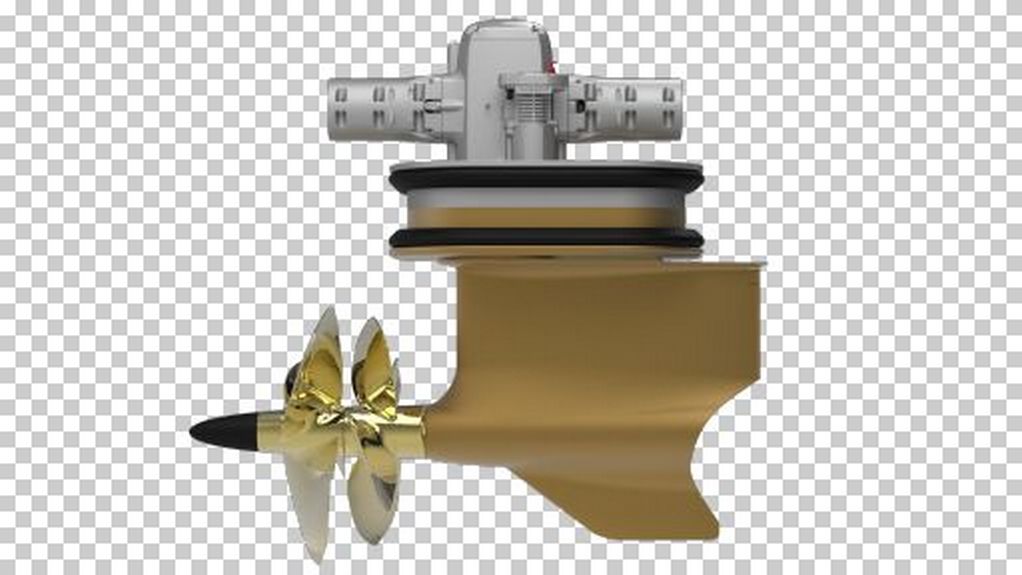Volvo Penta has announced a new version of its Inboard Performance System (IPS) propulsion package. Called the professional platform, it is aimed at vessels of 25 to 55 meters plus in length, with top speeds from 12-40 knots.
The platform, the largest and most powerful in the Volvo Penta IPS range, includes a new, larger marine drive, Volvo Penta IPS 40. The new drive is designed with a pioneering dual power input concept that, says Volvo Penta, manages the power to the water in the most efficient way and also acts an important enabler to utilize different combinations of energy sources.
Starting series production in 2025, the new Volvo Penta IPS 40 drive will be powered by two Volvo Penta D13 engines, paired with a compact after treatment system to comply with the latest IMO Tier III standards. However, the platform is already prepared for a mix of power sources; from combustion engines running on renewable fuels to fully electric or hybrid solutions. The dual power input design offers flexibility and modularity and the new platform is installed as twin, triple or quad, meaning each vessel will have from four to eight power sources. Te complete package from helm to propeller is designed, verified and serviced by one integrator – Volvo Penta.
Since its introduction almost 20 years ago Volvo Penta IPS has been adapted in a wide range of recreational and professional vessels with over 36,000 units delivered. The system’s exceptional maneuverability and forward-facing propulsion has delivered efficiency gains claimed to include up to 40% longer cruising range, 20% higher top speed and faster acceleration, compared to a traditional inboard shaft installation.
The new Volvo Penta IPS professional platform builds on this legacy. The propulsion package is compact and positioned far aft. This creates increased space onboard for relaxation, productivity, crew and cargo. Thanks to the through-hull suspension design and integrated exhaust system, the platform delivers premium onboard comfort by ensuring low noise and vibration levels.
The new platform is type approved and designed for heavy-duty commercial applications. It is expected to deliver up to 30% savings in fuel consumption and emissions compared to a traditional inboard shaft installation. Through a new efficiency-driven feature, the system can automatically start and stop individual engines based on the power needed for each given situation, optimizing fuel consumption and engine running hours, leading to extended service and maintenance intervals.
Backed by its worldwide authorized service network, Volvo Penta will offer global parts availability and 24/7 customer support for the new platform. Advanced connectivity will enable predictive maintenance, remote diagnostics and remote software download, all contributing to the premium level support and increased uptime.
Volvo Penta is carrying out in-house development to ensure thorough in-water testing using its own passenger high-speed ferry test boat, strategically located near its marine test facility in Gothenburg, Sweden. Rigorous testing is in progress to ensure the durability and performance of the propulsion package, with field tests in an offshore-energy crew transfer vessel serving as the subsequent phase leading up to the anticipated 2025 delivery.
Tags: IPS, Marine Vessels, Propulsion, Volvo Penta



Recent Posts
EST-Floattech Expands Octopus Series with Lithium Iron Phosphate Battery Modules
PowerCell’s Marine System 225 receives Type Approval from Lloyd’s Register
Echandia Secures SEK 325 Million in Funding to Advance Maritime Electrification
Scotland’s Largest Maritime Decarbonisation Project Launches at Port of Aberdeen
Fortescue, GH2, and Trovio Complete First Digital Fuel Certificate Pilot for Ammonia Bunkering in Rotterdam
Fortescue Recognised as Global Leader in ‘Real Zero’ Climate Action
Bureau Veritas Urges Rethink of Maritime Finance and Operations in New Book on Sustainable Blue Economy
APM Terminals Pier 400 Deploys Largest Electric Terminal Tractor Fleet at Port of Los Angeles